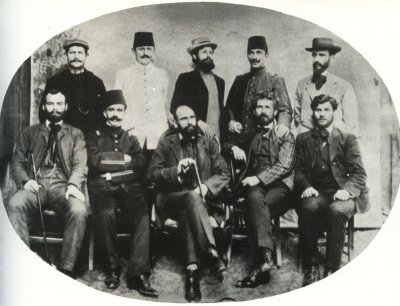By David Edenden
Below are two photographs that tell a story of hope and forgiveness.
The one on the top was the result of the Ilinden uprising of Macedonians in 1903. Macedonians had hoped that the "Great Powers" would be moved by the bloodshed to intervene on Macedonia's behalf, the way Clinton finally did in Bosnia. Too bad , so sad ... that was not to be. The Ottoman Turks put down the revolt with vicious brutality. (Is there any other was of putting down an uprising?).
The one on the bottom shows Yane (Jane) Sandanski, one of the leaders in the uprising, having his pictures taken with "Young Turk" officers of the 1908 Young Turk Revolution. Five years separate the two pictures. It demonstrates the human capacity to look to the future to shape a new world rather that dwell on the hatreds of the past ... even in the Balkans.
Sandanski gave up the armed struggle and formed "The People's Federative Party" to fight for Macedonian rights in the new Ottoman Parliament. Well, you know that this is the Balkans, and people do not live happily ever after. The Young Turks moved in a nationalist direction and began repressing minorities eventually leading the the "The Armenian Massacres" or more accurately "The Armenian Genocide".
Sandanski went back to the mountains and resumed the armed struggle. He managed to survive the Young Turks and the Balkan Wars in 1912, only to be assassinated in 1915 by agents of the Bulgarian Tsar Ferdinand who were ... you guessed it ... ethnic Macedonians.
So it goes.
Thursday, November 01, 2007
Subscribe to:
Post Comments (Atom)





The Young Turks' nationalist behaviour could be understood since nationalism was the uprising trend. They were thinking to build a nation state, rather than fighting for a better religious-community empire.
ReplyDeleteAnd using the term Genocide for Armenian.. -lets say- Banishment is even not correct historically since it is accepted after wwii.
But unfortunately this became a political issue, instead of a historical research.
nice blog, keep it up.. :)
oktay/turkey